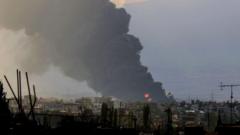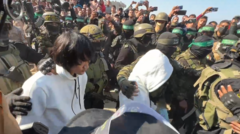The situation escalates as residents flee and heavy airstrikes raise concerns over cultural heritage sites.
**Israel Launches Airstrikes in Baalbek, Igniting Fears Among Displaced Residents**

**Israel Launches Airstrikes in Baalbek, Igniting Fears Among Displaced Residents**
Israeli military strikes target historic Lebanese city amid ongoing conflict with Hezbollah.
Israel has initiated a series of heavy airstrikes on the historic city of Baalbek, located in Lebanon's eastern Bekaa Valley, following urgent evacuation orders issued by the military. The strikes reportedly caused widespread panic as tens of thousands of residents fled the city, with local officials confirming that over 20 strikes occurred in the area, including five directly within the city, noted for its UNESCO-listed Roman temples.
Local mayor Mustafa al-Shell reported significant destruction, as smoke billowed from areas struck, including fuel depots owned by Hezbollah in the nearby town of Douris. The Israeli military confirmed targeting what they described as fuel depots crucial to Hezbollah’s military logistics, although specific details remain sparse.
The military activity coincided with a declaration from Naim Qassem, Hezbollah's newly appointed leader, asserting the group’s intent to persist in their conflict against Israel and implying continuity from the strategy of his predecessor, Hassan Nasrallah, who was killed in a recent airstrike. This announcement heightened the already tense atmosphere in the region, which has seen increased military action as Israel expands its operations into eastern Lebanon.
With Baalbek being a significant population hub near the Syrian border, its attack reflects a broader strategy targeting Hezbollah, which has historically been rooted in this area. The Israeli military has reportedly intensified its focus on further degrading the group’s operational capabilities amidst ongoing tensions that have led to over 1.2 million people displaced across Lebanon.
As panic spread following the evacuation orders, residents scrambled to leave, prompting urgent fears about the humanitarian crisis unfolding across the region. Videos shared on social media displayed extensive traffic jams as families fled the city, leading to a chaotic scene reminiscent of previous conflicts in the area.
Government officials indicated that while some families left Baalbek, many opted to stay behind for various reasons, including the distressing impacts of displacement. Reports emerged of strikes hitting civilian infrastructure, yet the mayor insisted there were no significant military targets in the city itself.
Additionally, Unesco has expressed grave concerns for the preservation of cultural heritage sites like the Roman temple ruins, urging all parties involved to safeguard these sites from the destruction of conflict. US officials have called on Israel to refrain from impacting civilian life and cultural landmarks.
Overall, the ongoing conflict between Israel and Hezbollah presents an urgent humanitarian crisis, further exacerbated by the recent surge in violence—a situation that continues to unfold as diplomatic efforts seek to address the turmoil stemming from the escalating hostilities.
Local mayor Mustafa al-Shell reported significant destruction, as smoke billowed from areas struck, including fuel depots owned by Hezbollah in the nearby town of Douris. The Israeli military confirmed targeting what they described as fuel depots crucial to Hezbollah’s military logistics, although specific details remain sparse.
The military activity coincided with a declaration from Naim Qassem, Hezbollah's newly appointed leader, asserting the group’s intent to persist in their conflict against Israel and implying continuity from the strategy of his predecessor, Hassan Nasrallah, who was killed in a recent airstrike. This announcement heightened the already tense atmosphere in the region, which has seen increased military action as Israel expands its operations into eastern Lebanon.
With Baalbek being a significant population hub near the Syrian border, its attack reflects a broader strategy targeting Hezbollah, which has historically been rooted in this area. The Israeli military has reportedly intensified its focus on further degrading the group’s operational capabilities amidst ongoing tensions that have led to over 1.2 million people displaced across Lebanon.
As panic spread following the evacuation orders, residents scrambled to leave, prompting urgent fears about the humanitarian crisis unfolding across the region. Videos shared on social media displayed extensive traffic jams as families fled the city, leading to a chaotic scene reminiscent of previous conflicts in the area.
Government officials indicated that while some families left Baalbek, many opted to stay behind for various reasons, including the distressing impacts of displacement. Reports emerged of strikes hitting civilian infrastructure, yet the mayor insisted there were no significant military targets in the city itself.
Additionally, Unesco has expressed grave concerns for the preservation of cultural heritage sites like the Roman temple ruins, urging all parties involved to safeguard these sites from the destruction of conflict. US officials have called on Israel to refrain from impacting civilian life and cultural landmarks.
Overall, the ongoing conflict between Israel and Hezbollah presents an urgent humanitarian crisis, further exacerbated by the recent surge in violence—a situation that continues to unfold as diplomatic efforts seek to address the turmoil stemming from the escalating hostilities.























